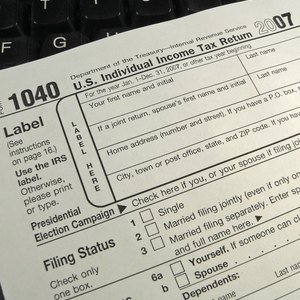
Accidental death insurance works as all other types of life insurance, except you have to die in a specific way. Of course, that way is by an accident. Just like other forms of life insurance, there's no income tax on the death benefit. However, federal and state estate tax may be due if the person who dies has enough assets and the estate is large enough for estate tax.
Federal Estate Tax
The federal government considers life insurance owned by the deceased as part of his estate. Therefore, any amount could be subject to federal estate tax. Congress sets the rules for the federal estate tax. For those billionaires like New York Yankees owner George Steinbrenner, the expiration of federal estate tax in 2010 meant a savings to the family of as much as $500 million. However, in 2011, the tax was back but not with the vengeance estimated, since Congress took action and lowered that top rate from 55 percent to 35 percent, while changing the exemption from $1 million to $5 million. However, this change is temporary and only lasts until Dec. 31, 2012.
State Inheritance Tax Or Estate Tax
Some states don't have a "death tax." Those that do tax, the estate of wealthier decedents often don't include life insurance in the estate. There is a catch to that however, life insurance, of any type, doesn't receive the bonus of omission from the estate if the beneficiary is the estate. That means, if Uncle Joe named you his beneficiary for his accidental death policy, you pay no inheritance tax. However, if he named you as beneficiary of the estate and left the policy to the estate, there's going to be tax on it if the estate is large enough for taxation.
Income Tax And Transfer for "Valuable Consideration"
It doesn't matter what type of life insurance you receive; you pay no income tax on it as long as you didn't purchase the policy or if the owner transferred the policy for valuable consideration from the owner just for the death benefit. One of these policy benefits are investments called viaticals. In the case of viaticals, the taxation is on the profit made from the purchase. However, viaticals are normally permanent life insurance plans purchased from older individuals or people with terminal illnesses, not accidental death policies. Another situation occurs when employees of an employee-owned corporation name other employees as beneficiaries to fund a buy-sell arrangement to purchase the shares of the corporation from the decedent's family.
Accidental Death Insurance Proceeds
If you take the proceeds from the company immediately in a lump sum, you have no taxes to pay. However, if you decide to take the proceeds in payments, which include interest, you will pay taxes on the interest.
References
- USA Today: Estate Tax to Return in 2011, And It Could Hurt Ordinary Folks; Sandra Block; July 2010
- "Forbes": JCT Summarizes Federal Estate And Gift Taxes From 1975-2011; Hani Sarji; Janiary 2011
- IRS Publication 525: Taxable and Non-Taxable Income
- Braun and Associates: Congress Passes New TEMPORARY Federal Estate Tax and Income Tax Laws: Implications for Texas Landowners; January 2011
- Paramount Life Insurance:Taxes and Life Insurance Benefits; February 2011
- Internal Revenue Service. "Life Insurance & Disability Insurance Proceeds." Accessed Sept. 28, 2020.
- Internal Revenue Service. "Estate Tax." Accessed Sept. 28, 2020.
- Tax Policy Center. "How Do State Estate and Inheritance Taxes Work?" Accessed Sept. 28, 2020.
- Internal Revenue Service. "Publication 559 Survivors, Executors, and Administrators," Page 26. Accessed Sept. 28, 2020.
- Internal Revenue Service. "Frequently Asked Questions on Estate Taxes: What Deductions Are Available to Reduce the Estate Tax?" Accessed Sept. 28, 2020.
- Internal Revenue Service. "Rev. Proc. 2005-25," Page 6. Accessed Sept. 28, 2020.
- Internal Revenue Service. "2104.02-00- Revocable Transfers and Transfers Within Three Years of Death," Page 2. Accessed Sept. 28, 2020.
Resources

